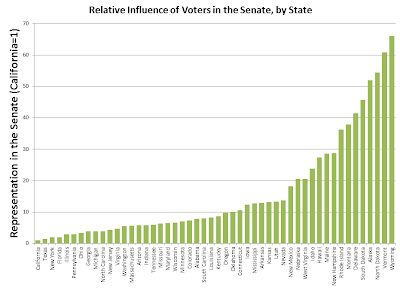Should We Abolish the Filibuster?
Matthew Martin
1/24/2013 07:06:00 PM
Tweetable
Let's reexamine the question: Should we reduce the threshold needed for passage from 60 to 51? I have long supported this type of reform, because the filibuster has caused massive costs to the country--how can we run an efficient bureaucracy when the opposition party will filibuster any nomination to government offices? a whopping 15% of the federal judiciary is empty, slowing down the entire legal system, simply because neither party wants to let the other fill all the seats.
But here is a counter argument. We should keep the 60 vote rule because the Senate is a fundamentally undemocratic institution. Unlike the House of Representatives, Senate seats are not apportioned by population, meaning that the Senate violates the first principle of any democracy or republic: the principle of one person, one vote. Instead, the Senate awards more votes to people in small states than it does to people in large states. For example, for each vote that someone in Ohio casts for the Senate, a person in Wyoming gets more than 20 votes. Because congressional districts can't cross state lines, the House of Representatives isn't perfect, but by comparison the problem is negligible in the House: for each vote that a person in Ohio gets in the House, a person in Wyoming gets 1.11 votes.
To show exactly how undemocratic the US Senate is, I've prepared this chart showing the relative influence of voters in each state on the Senate:
The most underrepresented state in the union is California, whose voters have less than 1/60th of the representation in the Senate as a Wyoming voter has. In an environment where voters in small states have disproportionate power, a "majority rule" is not what it seems--a majority of the Senate could represent as little as 16.3% of the population. Under a 60-vote system, passage of a bill requires representation of at least 34% of the population.
An ideal solution to this would be to abolish the two-senator rule and apportion Senators by population like any democracy would. Such a reform would not be easy. According to Article 5 of the constitution: "no State, without its Consent, shall be deprived of its equal Suffrage in the Senate." This provision says that instead of the ordinary three-fourths threshold required for all other amendments to the constitution, this amendment would require unanimous consent of all the states.
With that off the table, we could envision an alternative policy to set the cloture threshold at the minimum number of Senators needed to guarantee that a bill is supported by representatives of a majority of the population--that implies that no bill should pass the Senate without 83 Senators voting for it. Worth noting that the reason the current threshold is 60 is because we couldn't get anything passed back when the threshold was 66.
As a final comment, I will note that, as it happens, there are about as many small republican states (like Wyoming) as there are small democratic states (like Delaware). That means that so long as we care only about party lines and not regional interests, the two-senator rule actually does a reasonably good job approximating the breakdown of the popular vote. If there is a reason to abolish the filibuster without abolishing the two-senator rule, that is it. Funny how things work out.
